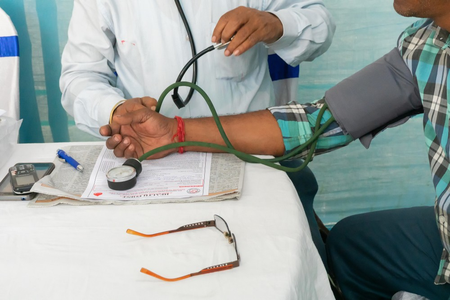
New Delhi, Jul 28 (IANS) Using a single pill comprising two blood pressure medicines is a safe and highly effective way to treat hypertension among South Asians, particularly Indians, finds a study led by the All India Institute of Medical Sciences (AIIMS), New Delhi.
The study, in partnership with the Centre for Chronic Disease Control (CCDC) and Imperial College London, UK, compared three widely used drug combinations: amlodipine plus perindopril, amlodipine plus indapamide, and perindopril plus indapamide.
The first randomised trial to test three different two-drug combination pills among South Asians involved over 1,200 patients with uncontrolled hypertension across 32 hospitals in India.
“All three combinations worked equally well in reducing blood pressure and were safe for patients,” revealed the study, published in the journal Nature Medicine.
The findings showed that either of the two-drug combinations led to a significant drop in blood pressure after 6 months — by around 14/8 mmHg when measured over 24 hours and about 30/14 mmHg in clinic settings.
“Nearly 70 per cent of patients got their blood pressure under control, a huge improvement over the current national average. And the pills were safe and easy to use. This study gives clear guidance for better hypertension care,” said Dr Ambuj Roy, Professor of Cardiology at AIIMS Delhi.
“This study shows that a single daily pill with two drugs can be a simple and powerful way to manage blood pressure in Indian and South Asian patients,” said Dr Dorairaj Prabhakaran, Executive Director of CCDC.
High blood pressure (hypertension) is the leading risk factor for death worldwide and affects over 300 million people in India alone. Treating it early and effectively can prevent heart attacks, strokes, and kidney failure.
Doctors often recommend starting with two medications in one pill to control blood pressure better and help patients stick to treatment. But until now, no large study had tested which combinations worked best for South Asians, who make up a quarter of the world’s population.
The results revealed that nearly 70 per cent of patients with any of the dual drug therapy reached the recommended blood pressure target of below 140/90 mmHg — five times higher than India’s current average control rate.
Less than 3 per cent of patients reported side effects serious enough to stop treatment.
“These findings can help guide doctors and policymakers. If added to India’s list of essential medicines and made available at primary health centres, these pills could greatly improve blood pressure control in the country,” Prabhakaran said.
–IANS
rvt/



